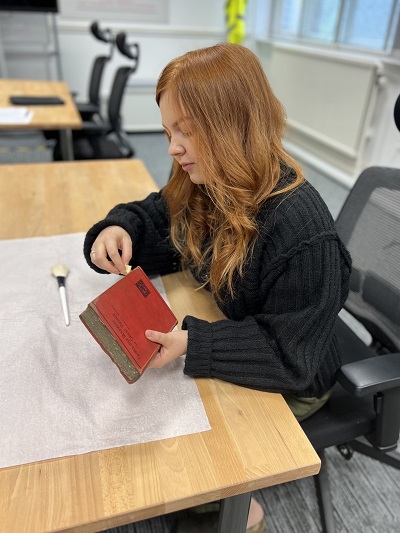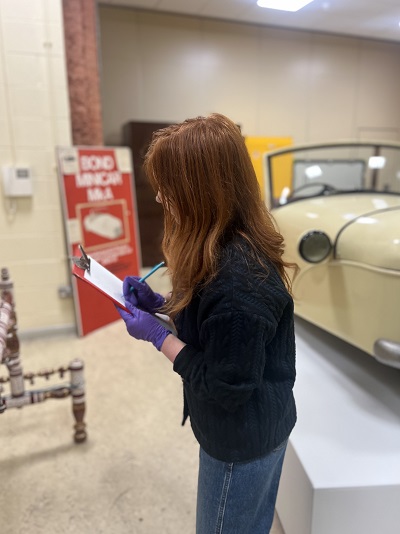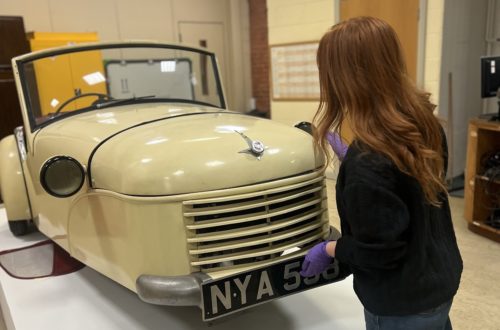Jessica Park, NWFed Member and a volunteer at the Co-operative Heritage Trust Archive in Manchester, applied for funding from our small grants scheme in 2023 to support travel costs for volunteering and to book on to collections management courses at Lancashire Conservation Studios. Here, Jessica explains why she applied for a small grant and the benefits it has had for her professional development.
Over the past year, I have been carrying out a range of activities in order to gain experience in collections management, as my career goal is to work with collections in museums. I have undertaken numerous courses and volunteered in varying institutions, with my most recent work taking place at the Co-operative Heritage Trust Archive in Manchester, where I have been recording the special collections inventory in the reading room, searching for duplicates and updating locations.
I work part-time in a different industry alongside volunteering and I have been undertaking development activities at my own cost, so when I saw that NWFed offered small grants to its individual members, I jumped at the opportunity. My application to the small grants scheme requested funding for train costs for travelling between my home and Manchester to volunteer, as well as the cost for collections management courses at Lancashire Conservation Studios.

Since receiving the grant, I have been able to visit Manchester every two weeks to volunteer and attended two courses in Preston, which has been a fantastic support. At the Co-operative Heritage Trust, my volunteer tasks have been focused on checking the bench book collections. I have been working in the reading room where the bench books can be picked up and used by readers in the room. They aren’t usually rare books; however, my task has been to go through each book to ensure that there are no special collections, duplicates or any that require conservation on the shelf. In Microsoft Excel, I have been adding relevant details about each book, including the author, title, condition, publisher, edition, year and language. Additionally, I have been making notes on any loose inserts and inscriptions in the books too. Once I have taken the book off the shelf, I have been adding a number to each volume using acid-free paper to aid with retrieval and reshelving. I have also been able to undertake active preservation by cleaning the books with a smoke sponge and brush, and I have utilised other archival and collections materials such as snake weights. Overall, this has been a wonderful experience for me as I have been able to build on my existing skills as well as gain new ones.
I was also able to attend two collections management courses at Lancashire Conservation Studios in September/October 2023, covering documentation, object entry, accessioning, labelling and marking, as well as their purposes, and the standards and processes around them in relation to collections management. I was keen to undertake courses like this so I could be confident in my volunteer roles and ensure that my work was up to museum accreditation standards. I also felt that as well as strengthening my own work experience and career prospects, my course attendance would benefit the places where I volunteer too.
The first course I went on was the labelling and marking course, where I was able to learn how and where to label objects, and to gain an understanding of just how important it is to label and mark objects correctly. I analysed a range of objects and decided how and where would be best to label them, which was fascinating.

The second course I undertook further explored collections care and expanded on courses I had taken earlier in 2023. Here I gained further knowledge of environmental conditions for varying collections and got to practice packing and storing objects for transport. It was such an amazing experience to learn about specialist materials and get the opportunity to practice with them. Both courses I have undertaken have allowed me to gain specialist experience and knowledge which I will take with me on my career journey in collections management.
I am really grateful to have received support from NWFed. It has allowed volunteering to be more accessible to me and has given me the opportunity to attend specialist courses on a subject not widely taught outside of universities. I feel I have developed my skills, particularly those relating to attention to detail, data management, organisation, and research. I am also very pleased with the networking opportunities that the volunteer roles and the grant have provided me with, as I’ve been able to meet archivists, historians, and fellow volunteers who share my passion for preserving and sharing history.

